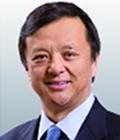Charles Li '91 Returns to Columbia Law School to Discuss World Economic Prospects
Charles Li '91 Returns to Columbia Law School to Discuss World Economic Prospects1
Media Contact: Public Affairs, 212-854-2650 or [email protected]
New York, Nov. 2, 2011—Back in 1993, when Charles Li ’91 was working as an associate at a U.S. law firm, several banks wanted to hire him because of his fluency in Chinese. After some strategic negotiation, he told a gathering of Columbia Law School students on Oct. 27, Merrill Lynch hired him as a vice president—at three times the salary he’d been making as a lawyer.
Li went on to become managing director and president of Merrill Lynch China, then chairman of JP Morgan China. In 2009, he joined Hong Kong Exchanges and Clearing Ltd. (HKEx), the holding company for the sixth largest stock exchange in the world. One year later, he assumed his current role as chief executive officer. HKEx, which was listed in June 2000, works closely with the principal regulator of Hong Kong’s securities and derivatives markets.
In his introductory remarks, Li said he is “very worried” about the state of the European economy, even after EU leaders reached a deal in late October to bring the crisis under control.
“People are finally realizing that whatever is going to happen, if Greece defaults in a disorderly fashion and then Ireland and Spain and Italy fall, Lehman is going to look like a small walk in the park,” Li said, referring to the collapse of Lehman Brothers in 2008. “We are going to see massive problems.”
He then turned to the Chinese economy, noting that its success has come at the expense of the peasants and that the country must now begin investing in the future of its people. He explained that the $3 trillion in U.S. dollars that China holds in foreign exchange reserves doesn’t belong to the Chinese government, it belongs to the “ordinary folks.”
“The current system of foreign exchange control causes structured inflation,” he said, “and that has to change.” He noted that most Chinese citizens are saving all of their money because of inflation and that the country needs a fair system for redistribution of wealth and a fair rule of law.
Li also described structural difference between the securities market in China and those in the United States and Europe.
“Other markets started with the broker/dealers,” he said. “They formed the exchanges, and everyone else had to go through a broker/dealer to make investments. In China, they started that way, but then realized there are so many crooks in that middle section and started again. The result is a see-through structure which is much more effective for regulatory purposes.”
Li concluded by telling students that their Law School education will give them two useful tools—a method of collective problem-solving through careful analysis, and relationships that will prove invaluable throughout their professional lives.
“Twenty years from now, when you call to ask someone for a favor, they’re going to ask ‘Why?’” he said. “And you’re going to say, ‘Because we went to Columbia together!’”
The talk was sponsored by the Society for Chinese Law, the Asian and Pacific American Law Students Association, and the Columbia Business and Law Association.
# # #
Columbia Law School, founded in 1858, stands at the forefront of legal education and of the law in a global society. Columbia Law School joins traditional strengths in international and comparative law, constitutional law, administrative law, business law and human rights law with pioneering work in the areas of intellectual property, digital technology, sexuality and gender, criminal, and environmental law.
Visit us: http://www.law.columbia.edu/
Follow us on Twitter: http://www.twitter.com/columbialaw
